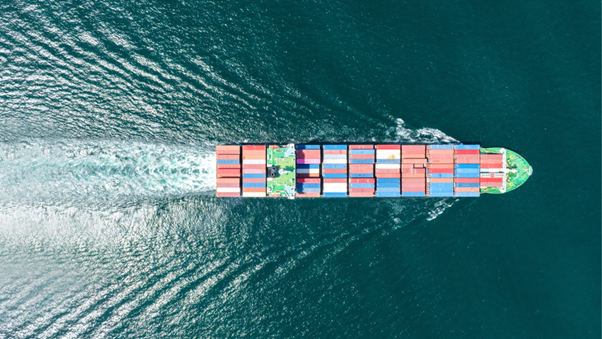
Marine cargo insurance is a lifeline for businesses reliant on shipping and logistics. It safeguards against potential financial losses arising from damaged or lost cargo during transit. Any business involved in the transportation of goods by air, sea, rail, road, post or courier should ensure they purchase marine cargo insurance (also termed marine transit insurance).
Finding the right insurance package to suit your particular operations may not appear straightforward. We’re here to help. We’ve put together five essential tips to help you identify the right marine cargo insurance provider for you. Before we go into the details, let’s briefly outline what marine cargo insurance is, and what it generally covers.
What is marine cargo insurance?
Marine cargo insurance (also called marine transit insurance) can protect you from loss, damage or theft of goods in transit worldwide by air, sea, rail, road, post or courier. It can also include coverage for shipment delays, and can cover goods whilst in storage along the entire supply chain.
Examples of risks a marine cargo insurance policy covers are:
- accidental physical damage during the trip
- insured events such as fire, collision and other occurrences
- collision of the carrying vehicle
- damage during loading and unloading
- fire, explosion and lightning
- Malicious damage
Types of cover
In terms of how it works, businesses can generally choose between the following two types of cover arrangements:
Open or Annual Cover: This cover is for regular importers and exporters in Australia, and typically spans 12 months. Initially, insured parties estimate the total value of imports or exports, considering factors like goods type, destination, transport method, packaging, valuation method and average shipment value. At the end of each policy year, the insurer may request an actual goods value declaration, potentially leading to a premium adjustment.
Single Journey Cover/Claim: This coverage is for a single journey, typically bought by individuals or small businesses for a one-time goods shipment. A single upfront marine insurance payment is made at the start of the journey, with no additional payments or adjustments.
Now that we’ve summarised what marine cargo insurance is, let’s look at what you need to do to ensure you find the optimal insurance policy from a reliable provider.
1. Understand Your Coverage Needs
Each business has unique cargo and transit requirements. It’s essential to understand your specific needs before purchasing marine cargo insurance. So before going on the hunt for an insurer, it’s a good idea to have an understanding of the types of risks your business faces, and what kind of coverage is available. It’s also important to know areas where you are concerned you might not be covered. To do this, consider the following factors:
- Type of Cargo: Different types of cargo may require specialised coverage. It’s important to ensure your policy adequately protects your goods. To go about this, you can opt for a broad-reaching policy that covers the full scope of types of cargo you may be carrying, or you can adjust your policy as you go if the types of cargo you carry changes. As part of this, you need to have details on the value of your shipments, how they are packaged, and so on.
- Destination: Where your cargo travels can impact the level of risk. Certain countries or individual ports may experience higher levels of mishaps, interference or theft. If your cargo is travelling through these places, your policy may need to be adjusted accordingly.
- Shipping Vessel: The type of shipping vessel used to transit your cargo can affect the risk profile. Be sure your policy accommodates your chosen mode of transportation.
- Risk Assessment: Evaluate the level of risk associated with your cargo. This assessment can help determine the coverage required. (Usually, this is done with your insurer, but it doesn’t hurt to consider the risks before you discuss it with them.)
2. Look for Reputable Insurers
The reputation of the insurer matters significantly in the world of marine cargo insurance. Opt for insurers with a track record of reliability and transparency. A reputable insurer is more likely to process claims efficiently and provide reliable support when needed.
When trying to work out if an insurer is reputable, do the following
- Check the insurer’s website. Do they offer any kind of guarantees around claims response times? (It’s a positive sign if they do.)
- Does the insurance company or insurance broker have experience in dealing with a business like yours? If so, it’s a sign they will be able to understand the ins and outs of the shipping activities you’re involved in, and can offer you an accurate appraisal of the risks you face, before matching you with a comprehensive policy.
Unfortunately, as marine cargo insurance is somewhat specialised, many online insurance ratings won’t involve insurers that provide this type of insurance, so working out reputation via online search can be challenging. Working with an insurance broker experienced in marine cargo insurance can help you sort the wheat from the chaff. They will know which insurers have a solid reputation for processing claims and providing quality customer service.
3. Compare Different Plans
When searching for marine cargo insurance, never settle for the first option that comes your way. Instead, conduct thorough research to identify multiple insurance providers. Consider the following factors during your comparison:
- Reputation: Look for providers with a strong reputation for reliability and prompt claims processing. Customer reviews and testimonials can offer valuable insights.
- Experience: Providers with extensive experience in the marine cargo insurance industry are often better equipped to handle various challenges and situations.
- Coverage Options: Ensure the provider offers coverage that aligns with your specific cargo and transit needs. Tailored policies can save you money and provide better protection.
Consider using a broker
To make the task easier, it’s worth dealing with an insurance broker with experience in goods transit. A broker will have access to a large number of marine cargo insurance providers, and can find the best deals for you, saving you time.
4. Disclose All Relevant Information
Honesty is key when it comes to obtaining comprehensive marine cargo insurance that covers you for the risks your business faces. Withholding information from an insurer may result in a future claim being rejected, which is why it’s essential to provide all necessary information to your insurer.
Be transparent about the type of cargo you are transporting, its packaging, and any potential risks associated with your shipments. The insurer will most likely also identify risks you hadn’t considered.
It’s important to maintain good records of the goods you are transporting, so that you can produce this information in the event of a claim. It’s also vital to inform your insurer if anything changes. For instance, if the type of goods you are transporting changes, the value of the goods increases or decreases, or the destination changes, this may all affect your cover level and premiums.
5. Seek Out Good Customer Service
Customer service might not be the first thing you think of when looking for marine cargo insurance, as cost factors are typically the primary concern. However, it’s helpful if the customer service you receive from an insurance broker is excellent. You need to be able to easily contact the insurer about claims, receive a fast response and proceed through an efficient claims process. Poor customer service can make it difficult to deal with a claim quickly, and you don’t want to be left in the lurch, as waiting on a claim can impact your business.
When considering an insurer or insurance broker’s customer service record, do the following:
- Look online to see their customer service record. Do they have good reviews and/or positive testimonials from customers? If not, it may be best to look elsewhere.
- When making an online enquiry, do you receive a prompt and positive response? If not, it might be a sign that another insurer may serve you better.
- Ask around in your industry for recommendations on insurers or insurance brokers. It’s useful to know what kind of experiences similar businesses to yours have had with different insurers.
Excellent customer service can make a significant difference when dealing with marine cargo insurance. Evaluate the provider’s customer service quality, including their responsiveness and willingness to assist. A provider with exceptional customer service can help streamline the claims process and address your concerns promptly.
Conclusion
Marine cargo insurance is a crucial safeguard for businesses engaged in shipping and logistics. By comparing providers, understanding your coverage needs, choosing reputable insurers, disclosing all relevant information and seeking good customer service, you can secure the best marine cargo insurance policy for your unique business requirements.
Steadfast Eastern Insurance Brokers are a trusted group in this field, offering customisable marine cargo insurance solutions. We can assist you in comparing different providers to find the most suitable option for you. Contact us today.
Have other insurance requirements? Steadfast Eastern Insurance Brokers are specialists in a range of insurance types, including business insurance, commercial landlord insurance and more.
Back to News
